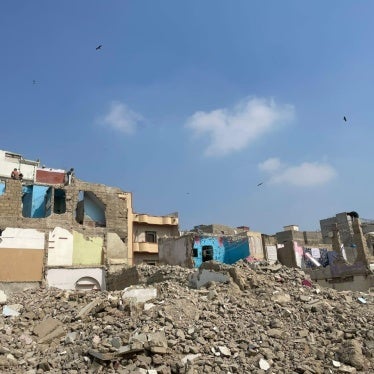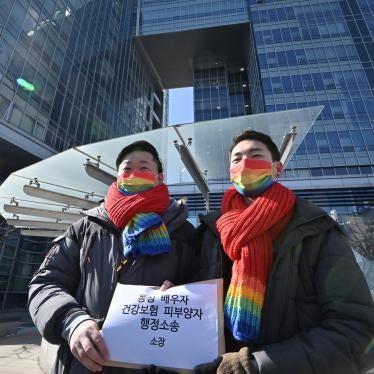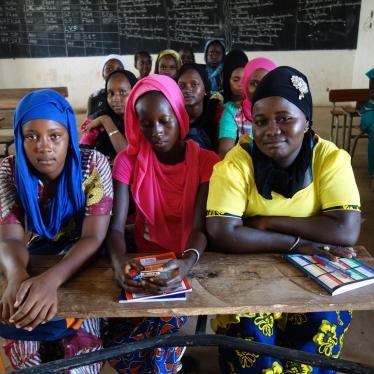The Rt Hon David Miliband MP
Secretary of State for Foreign and Commonwealth Affairs
Foreign and Commonwealth Office
King Charles Street
London
SW1A 2AH
Dear Foreign Secretary,
Last month Human Rights Watch wrote to the Prime Minister, Gordon Brown, in advance of his trip to China, raising a number of concerns about domestic human rights issues and foreign policies with human rights ramifications. We have not received a response to that letter, and we are concerned at the Prime Minister’s failure to publicly discuss human rights issues during his visit despite the subsequent round of the UK-China human rights dialogue and the upcoming Olympic Games. We write again to urge you to take a strong public position in support of human rights on your upcoming visit to Beijing.
The UK government must be candid about China’s failure to meet its Olympics-related commitments to improving human rights. Failure to do so at this critical juncture will waste the historic opportunity of the Beijing Games, which Lord Malloch-Brown last month described as “another step change, not a temporary aberration where freedom is granted and then taken away, but a process of locking in a greater degree of press and other freedoms.”
Therefore, we ask again that you act on several human rights issues during your upcoming visit.
In December 2006, the Chinese government unveiled new temporary regulations designed to give accredited foreign journalists expanded freedoms in the run-up to and during the 2008 Olympic Games in Beijing. That decision appeared to mark a significant easing of the tight official controls on reporting activities that have long constrained foreign correspondents’ freedom of expression in China. However, Human Rights Watch research indicates that these regulations are being persistently flouted and that foreign journalists, including British journalists, continue to be routinely harassed, detained and intimidated by Chinese government officials, security forces and plainclothes thugs who appear to operate at official behest. Meanwhile, Chinese journalists and foreign correspondents, researchers, and translators and assistants continue to risk serious reprisals from state agencies for reporting that does not conform to the dictates of the official propaganda system.
Human Rights Watch continues to document routine violations of the new temporary regulations, including an attack in January 2008 by rock-wielding thugs on German journalists attempting to interview Yuan Weijing, the wife of jailed activist Chen Guangcheng. In September 2007, a Reuters correspondent who was interviewing detainees in an illegal detention facility in Beijing was beaten and threatened with death by plainclothes thugs. In both these incidents those thugs appeared to be working at official behest. The risks faced by Chinese reporters was highlighted earlier this month when freelance journalist Lu Gengsong received a four-year prison sentence on “subversion” charges after reporting on corruption and the trial of a human rights defender.
We are aware that you have already asked the Chinese government to uphold the temporary regulations, make them permanent, and extend them to Chinese journalists. We now believe that you must tell your Chinese counterparts that if significant improvements with respect to press freedom have not materialized by April 1, you and senior members of your government will decline invitations to attend the opening and closing ceremonies. As an Olympic host and a promoter of human rights globally, it is especially important for the United Kingdom to set and defend such standards.
Moreover, despite the Chinese government’s pledges in 2001 that hosting the 2008 Olympic Games would boost the development of human rights in China, the prosecution of two high profile dissidents suggests that China has effectively criminalized public criticism of official preparations for the Olympics. Human rights activist Hu Jia was arrested on December 27, 2007, and faces up to five years imprisonment on charges of “subversion” in apparent retaliation for his testimony in November to the European Parliament via web phone on human rights abuses related to the Beijing Olympics. Yang Chunlin, a land rights activist, was prosecuted on “subversion” charges in a one-day trial on February 19. Those charges stemmed from his participation in collecting signatures for a petition entitled, “We want human rights, not the Olympics,” which was signed by more than 10,000 people.
Such politically-motivated prosecutions are a betrayal of both the Olympic Charter’s dedication to “fundamental ethical principles” as well as the Chinese government’s commitments to improve human rights ahead of the Beijing Games. These abuses obligate you to raise with the Chinese leadership the cases of Hu Jia and Yang Chunlin and demand their immediate release. We also ask that you make a point of inviting Hu Jia’s wife and fellow activist, Zeng Jinyan, who remains under house arrest for more than 200 days, to meet with you at one of the events you will host while you are in Beijing. While the invitation will likely be intercepted and destroyed by the security forces which around-the-clock surveil Zeng Jinyan and her family, the symbolic power of such an invitation for China’s beleaguered dissident community cannot be overestimated.
Finally, your government last month lamented the lack of attention to “developments in China’s legislative framework to provide greater protection for the rights of its citizens” and continues to fund rule of law projects in China. Human Rights Watch will soon release a comprehensive report that documents physical abuse, arbitrary professional sanction and criminal prosecutions against Chinese lawyers in retaliation for their efforts to secure justice for victims of official abuse. Such abuses cannot be dismissed as idiosyncratic, but demonstrate the Chinese Communist Party’s concerted efforts to prevent the judiciary from becoming an effective check on power. Your government has repeatedly acknowledged the importance of an independent legal system in which lawyers play a key role in ordinary citizens’ ability to access justice. We ask that you make the arbitrary arrest, detention, and supervision of lawyers who act professionally to defend human rights a prominent topic in your meetings next week.
If you fail to raise these issues, in effect you make the United Kingdom a partner in the Chinese government’s effort to impose a picture of harmony and stability over the more complicated realities of China before the Games. Such silence will come at the cost of betraying those imprisoned Chinese men and women whose sole offense was simply to challenge that picture. We hope you will raise human rights concerns strongly behalf of the United Kingdom, and align it with those that have courage to speak out, rather than those who fear dissent and crush it.
Yours sincerely,
Tom Porteous
London director
Human Rights Watch
Sophie Richardson
Asia Advocacy Director
Human Rights Watch






